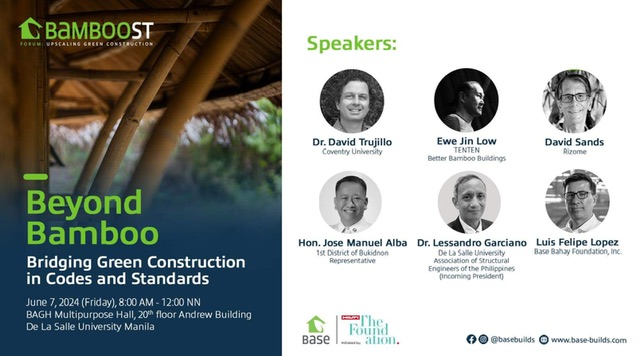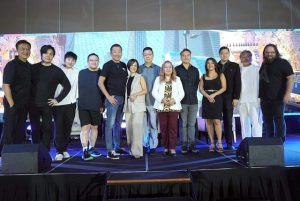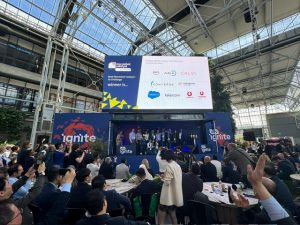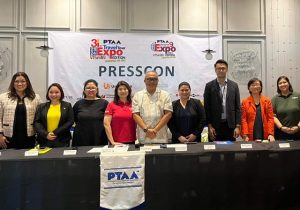Exploring “Beyond Bamboo” at the Third Session of Bamboost Forum

On June 7, Base Bahay Foundation (BASE), the global leader in bamboo-based research and technology and pioneer in Bamboo Construction, is bringing together a respected lineup of international bamboo experts to speak on “Beyond Bamboo: Bridging Green Construction in Codes and Standards” at the third annual Bamboost bamboo forum from 8:00-12:00 noon at the BAGH Multipurpose Hall, Andrew Building, De La Salle University Manila.

Registration is open for all professional architects, civil engineers, students, researchers, developers, and bamboo enthusiasts. As a program accredited by the Professional Regulations Commission (PRC), professional architects and civil engineers will earn 2.0 and 1.5 CPD units respectively towards their continued professional learning and development.
Joining this event to share their expertise in bamboo construction are Dr. David Trujillo of Coventry University, Ewe Jin Low of TENTEN and Better Bamboo Buildings, David Sans of Rizome, Dr. Lessandro Garciano of the Association of Structural Engineers of the Philippines (ASEP) and De La Salle University, and Luis Felipe Lopez, the resident expert of BASE.
The 1st District Representative of Bukidnon, Hon. Jose Manuel Alba will also deliver the keynote message for this event. Congressman Alba filed House Bill (HB) 9144, which advocates for the integration of bamboo into the built environment.
At the forum, participants will have access to the latest research and innovations in bamboo. Likewise, it aims to push the boundaries of traditional construction practices and highlight the importance of including bamboo in the National Structural Code of the Philippines (NSCP).
The integration of bamboo into construction practices offers various environmental, economic, and structural advantages, making it an ideal choice for sustainable construction.
Luis Lopez, who in his role as Base Head of Technology oversees research, training, and application of BASE’s Cement-Bamboo Frame Technology in the Philippines, explains that a key part of BASE’s commitment to promoting sustainable housing technologies is constant innovation. Already, BASE’s Cement-Bamboo Frame Technology has been certified by the National Housing Authority’s Accreditation of Innovative Technologies for Housing (AITECH). The next step is to help shape local structural codes for bamboo, aligned with the Philippine National Standard (PNS) 22157 which informs testing procedures for obtained bamboo culms, and the International Organization for Standardization’s ISO 22156 which aims to institutionalize the use of bamboo in structural design.
The annual Bamboost is part of BASE’s learning series for bamboo construction enthusiasts. BASE conducts training programs for professional builders such as architects and civil engineers under its Bamboo Academy Program to give them a head start in anticipation of the standardization of bamboo construction and design and mainstreaming of bamboo in building codes.
An initiative of Liechtenstein-based Hilti Foundation, BASE continues to provide alternative building technologies to enable a network of partners to build quality socialized homes that are comfortable, affordable, disaster-resilient, ecologically friendly, and with social impact. To date, Base has built more than 1,500 homes using its proprietary Cement-Bamboo Frame Technology sheltering over 5,500 individuals in 19 communities across the Philippines and in Nepal.
For more information on Base Bahay Foundation Inc., its Continuing Professional Development (CPD) series and ongoing projects, visit http://www.base-builds.com.




